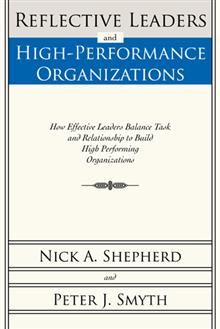Inside the Book
 Title:
Title: Reflective Leaders and High-Performance Organizations
Author: Nick A. Shepherd and Peter J. Smyth
Publisher: iUniverse
Genre: Business and Economics
Format: Ebook/Paperback
An organization operating in the twenty-first century is different from one that operated during the Industrial Revolution. Today’s focus is on optimizing human potential; people are the enablers of most aspects of intangible value. People develop relationships with suppliers, customers, distributors, and other third parties through which work is executed. In Reflective Leaders and High-Performance Organizations, authors Nick Shepherd and Peter Smyth take an integrated view of organizational performance that blends a focus on both outcomes and relationships.
Reflective Leaders and High-Performance Organizations suggests a framework for developing and applying an improved approach to organizational leadership and management. In addition to philosophy and conceptual approaches, it presents tested practical tools and direction. It also delivers case studies of organizations that have applied Shepherd’s and Smyth’s ideas and realized measurable improvements in the day-to-day activities of the organization, along with measurably improved outcomes from the organizational activity.
Using over twenty years of practical consulting experience as well as careers in management, Shepherd and Smyth demonstrate how effective leaders can maintain a focus on organizational tasks and outcomes and do this while building and enhancing human relationships.
ORDER INFORMATION
Reflective Leaders and High-Performance Organizations is available for order at
Guest Post
“My boss is such a moron – she only occasionally listens to what I have to say and even then seems to ignore my ideas.” Sound familiar? While we may not have uttered the words directly it is quite possible that we may have heard it from others. How true is it?
The reality is that many people get promoted into leadership positions – not on their ability to lead but on their ability to get the job done. Yet once in a leadership position they often come to realize that they rise or fall based not on their own efforts but on the work of others; the result can be that they constantly hound their staff for results – thinking that is their job. Yet this creates dissention, unhappiness and an overall loss of morale.
What do effective managers do? In our book “Reflective Leaders and High-Performance Organizations” we share ideas developed over 25 years of working with individuals and groups. We describe how effective leaders must start by understanding their own personality and behavior and how this seen by others. Many of us see ourselves in a different way than others see us - and are surprised when we receive feedback that fails to match our own perceptions of ourselves. What “I think about myself” in my reality but unfortunately it may not be the reality of others!
Effective leaders learn to “look in the mirror” so as to start understanding how they are seen by others and how that determines how others respond to them. So to be an effective leader starts with the willingness to:
a. Have an open mind about opportunity for personal improvement;
b. Be willing to receive feedback from others in a “non-defensive” way, and
c. Be willing to take the feedback, learn from it and seek ways to improve.
People who are placed in leadership positions hold both the success of a department or an organization in their hands. It is almost a “sacred trust.” They have the potential to grow and develop other people in a way that maximizes their potential and brings the greatest benefit individually and organizationally. This is a critically important opportunity – there are no successful organizations only successful people – and successful people are encouraged and developed by effective leaders.
Meet the Author
Nick A. Shepherd has more than forty years of business experience. Since 1989, he has owned the management-consulting and professional-development company, EduVision Inc., which provides management-consulting and development services to public and private sector organizations.
Peter J. Smyth has over thirty-five years of experience in the fields of adult education and organizational consultation, counseling, psychology, social work, and mental health. He holds numerous qualifications in the areas of teamwork, leadership, coaching, emotional intelligence, and personal and organizational assessment.
Shepherd and Smyth have worked together for over twenty-five years facilitating workshops and helping clients enhance their teams and leadership capabilities.
 Title: Reflective Leaders and High-Performance Organizations
Title: Reflective Leaders and High-Performance Organizations
No comments:
Post a Comment